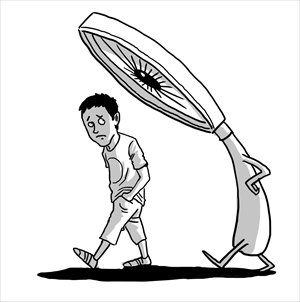Singaporeans keen to promote paranoia of controversial big govt

Many tourists jokingly call Singapore a "fine city" because fines are surprisingly high in this country.
But thanks to various government bans, such as those on graffiti and littering, enforced by harsh fines, Singapore is astonishingly clean.
It's not hard for a government to issue bans, but how to consistently enforce these bans and maximize their effect is a challenge. Adding law enforcers is obviously not a good measure, since it both raises costs and brings up the question of supervision of the enforcers themselves.
What Singapore adopts is not arranging law enforcers everywhere to target individuals. Only a few law enforcers on the street fine pedestrians who litter, or stop passengers eating things in the subway. The maintenance of public order in Singapore largely relies on people's self-control.
How does this self-control take place? In order to answer the question, I have to mention Michel Foucault, a French philosopher. Inspired by the design of panopticon, Foucault explored social control in depth.
To put it simply, a panopticon is a kind of prison in circular shape, with cells at the circumference and warders in a tall watchtower at the center.
Warders can easily keep watch on all the prisoners' activities, while inmates cannot see warders. Such a prison is unique in reducing supervision costs. Intermittent as the supervision may be, prisoners believe they are watched all the time.
As a result, they will behave themselves. The advantage of the panopticon is that it can contribute to self-supervision without intervention.
I often ask students in class why Singaporeans do not spit or litter and why Singaporean drivers willingly stop in front of crosswalks.
Students admit honestly that they are very afraid of being fined and shown on the news, thanks to their knowledge of the possibility of cameras and plainclothes law enforcers.
Certainly, some people will consider this supervision as an overextension of state power. Some regulations, like having to use your real name to buy chewing gum, may be seen as infringing individual freedom. In fact, comparing the state's control over society to warders' watch on prisoners is being somewhat sarcastic.
But which would you choose? Cleaner streets or more freedom? This is not an either-or question. Obeying the regulations is part of having civil spirit. Only when fulfilling obligations can you enjoy the freedom that you should have.
Singapore has an orderly society with a "big government," which does not fit some people's political philosophy. In their view, the government ought not to intervene in and control society in such detail. What they prefer is an orderly society with "small government."
However, Singaporeans are apparently willing to accept big government. What really matters is that to realize order remains the final goal of Singaporean society.
If fines became civil servants' source of income, rather than a way to achieve public order, the bans would have been lifted long ago.
The actions and attitudes of the government, big or small, determine public attitudes. If the state's intervention in society aims to protect some interest groups, instead of expanding public interest, such an intervention is no doubt for the worst.
The author is a scholar at the Department of Political Science at the National University of Singapore. opinion@globaltimes.com.cn